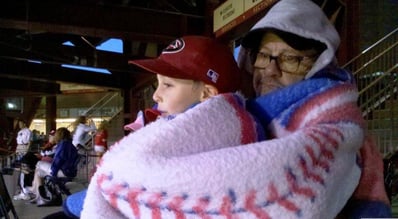Buying brisket and being human - Blog - Reeve Foundation
A few years ago, I was in Denver at a psychology conference. Being a big baseball fan, I attended Colorado Rockies game at Coors Field one evening. When I arrived at the stadium, I was greeted by a large sign that said: “Home of the World-Famous Brisket Sandwich."
Being a quadriplegic and an aging one at that, I tend not to eat food like that. But I figured if it was world-famous, so I decided to give it a try. Coming home on the trolley, I realized why it was world-famous. The last time I felt that sick, I was in college and drank too many beers and ate too many oysters! This time I was cold sober and I just wanted to curl into a fetal position and call for my mommy.
On one of the trolley stops, three kind looking twentysomething year old men climbed on. Each were wearing black pants, white shirts and carrying Bibles. One of them gently put his hand on my shoulder and said: “May I pray for you? Because God wants you healed”. Okay I’m not proud of this but, my first thought was: “it’s only a little indigestion, no need to call out the big guns here, just a little antacid should do the trick!"
So there I was minding my own business, living my life and all of a sudden I had to be cured of  something. I used to get furious when people looked in my direction and just saw stainless steel but didn’t see me. And occasionally I still do get angry, but usually I simply assert myself back into the conversation reminding them that I am a real person.
something. I used to get furious when people looked in my direction and just saw stainless steel but didn’t see me. And occasionally I still do get angry, but usually I simply assert myself back into the conversation reminding them that I am a real person.
We’ve all had had the experience that when we meet someone, they talk over us to whoever we are with. Or they treat us like we are either hard of hearing, cognitively impaired or invisible. Of course, being ignored isn’t exclusive to us, think about religious minorities, people living on the streets etc.
It’s called alienation and typical reactions to alienation are to either withdrawal or act out aggressively. I’ve done both. And when I have withdrawn it has hurt me. When I act out aggressively, it hurts someone else. Both feel terrible.
So how do we find our way back without hurting ourselves or others? How can we be seen for who we are?
A while back when I was in a very dark place emotionally and feeling helpless and hopeless, a friend and fellow psychologist came over to visit. When I told her of my loneliness and feelings of being disconnected from others, she leaned across the table and put her hand on mine and said: “Dan, you are a teacher now. You have no choice about that. People will look at you and make generalizations about people with disabilities. You may have no choice about being a teacher, but you do have control over what you teach and how you teach."
I could teach through my behavior and attitude that we are, in fact, out of the loop. I could teach that we are angry or withdrawn. Or I could teach that we are human with brains and hearts and emotions just like them. That we love and experience joy and gratitude, that we can survive adversity and come out the other side. And I do it by making eye contact with others and smiling.
For years I tried to tell people what it was like to be a quadriplegic in hopes of being understood.
I failed. Nobody who hasn’t experienced it can understand autonomic dysfunction or lack of sensation or not having control over bowel and bladder. So I gave up.
But since that time, I’ve been talking about feelings of vulnerability and fragility. Feelings of helplessness and dependency and depression. And shame. And the longing to have something we once had and cannot have. That’s when people began to connect with me and I with them. They didn’t understand my quadriplegia, but they sure understood my humanity. I’ve taken this story to middle schools in poverty-stricken neighborhoods, to high schools in rural areas, to prisons and synagogues and churches and retirement communities and the radio. And the feedback I get is something akin to: “I feel like you told my story."
I have two pieces of advice to leave you with:
- spend more time talking about your humanity then your disability.
- Stay away from the World-Famous Brisket Sandwich at Coors Field!
Join Our Movement
What started as an idea has become a national movement. With your support, we can influence policy and inspire lasting change.
Become an Advocate